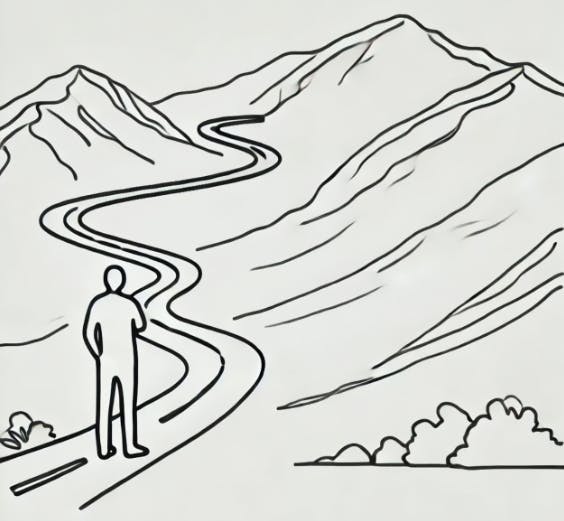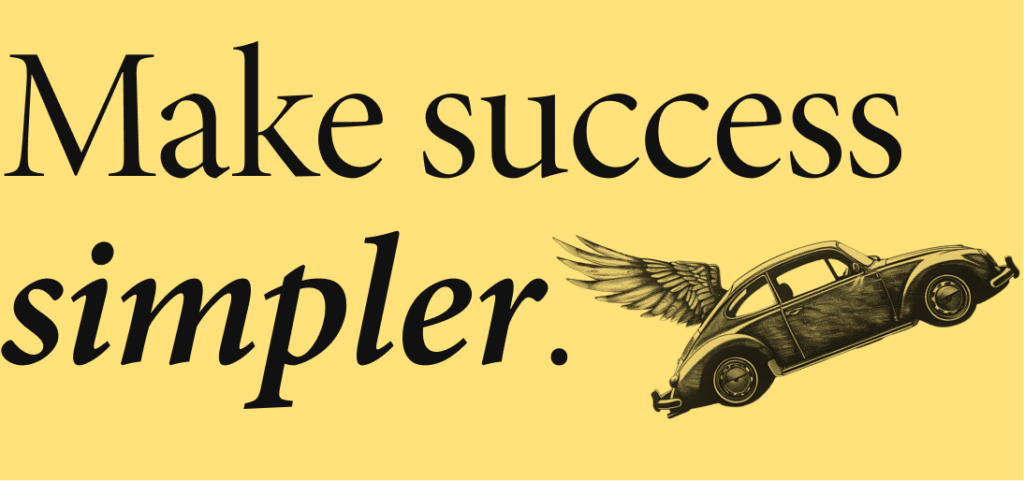Welcome to One Thing Better. Each week, the editor in chief of Entrepreneur magazine (that’s me) shares one way to be happier and more effective at work — and build a career or company you love.
Today’s edition is sponsored by Kick, my favorite bookkeeping software (for real!). See details at the end of the newsletter.

Maybe you started a business. Or pursued ambitious goals. You set the bar high, which meant that your life is often busy and complex — and sometimes you wonder: Did I do this wrong?
A reader named Vanessa recently asked me that. She works at a startup, which is exciting but exhausting. She wrote:
“The highs are high, but the lows are low. I truly love what I do but sometimes question the risk and wonder if I should’ve taken a more traditional career path. How do I square that?”
Here’s my answer: Don’t question your past. Instead, take what you need from it.
Think of it like this:
Vanessa’s choice is NOT: “My current path vs. a path I did not choose.”
That choice leaves you stuck. It’s like creating an original sin — a decision you cannot escape, that controls your future.
So instead…
Vanessa’s choice actually IS: “My current path vs. what this path sets me up for next.”
In other words, don’t think of your past as a mistake. Instead, ask what your past has provided you. What has it has taught you? What it has prepared you for? And how can you put that to amazing use next?
Today’s newsletter is for people looking for new paths, but also for people looking to grow in their current path. You don’t need to abandon what you’re doing in order to make a useful change. Either is good.
Now let’s find those answers.
How to use yesterday for tomorrow
The core idea here is simple: No time is wasted.
When we believe that we wasted our time, we discount the growth and transformation we experienced along the way. Are you in an industry that you no longer love? Are you doing something that drains your energy? Are you in a relationship that no longer fulfills you? That sucks. You should make a change. But that does not mean the time was wasted.
You learned something valuable and transferrable. Better yet, that gives you an advantage wherever you go next.
So let’s identify what that is. Ask yourself two questions:
Question 1: What am I really good at today, that I was bad at before?
I like this framing because it’s about progress.
Think back to the start of your journey. If you regret working in startups, what were you like before you joined your first startup? Now measure your distance traveled: What are you definitively better at today, as a result of that work?
Next, let’s ask…
Question 2: How can my skills be applied in powerful new ways?
You have skills. Maybe you worry that they’re only useful in your current role, or your current industry. But you’re wrong.
Your skills are transferrable — and in fact, the skills from one part of your life could make you even more valuable in another. They’ll give you a competitive advantage in industries where most people don’t have your skills, and allow you to stand out in unique ways.
In his upcoming book, my friend Jonathan Goodman calls this “1 + 1 = 10”. When you combine two unexpected skills, you become 10 times more valuable.
For example, let’s apply this to Vanessa. She surely learned all sorts of skills in startups — like a high tolerance for risk and an ability to pivot quickly. Those are amazing assets anywhere. She gets to choose her path, armed with hard-won advantages. (For more on how to choose that next path, read about a concept I call “the ticket.”)
In fact…
This is also what propelled my career!
Look, I’ll be candid: As editor in chief of Entrepreneur magazine, people think I have a cool job. And they’re right! But it has caused me a lot of anxiety. I often questioned whether I made the right choice.
Here’s why:
I’ve spent my career in media, going from small-town newspaper reporter to national magazine editor. But as I rose, the industry shrank. Layoffs were everywhere. Salaries plummeted. For a long time, I wondered: Did I take the wrong path? Am I an expert in a dying field?
Then I realized something incredible. Let’s look at it through the lens of my two questions above.
Question 1: What am I really good at today, that I was bad at before?
The answer is this: By learning to edit magazines, I didn’t just “learn to edit magazines.” Instead, I’d become great at digesting complicated information, and then sharing it in simple and easy-to-follow ways.
Question 2: How can my skills be applied in powerful new ways?
I applied that skill to business — supporting founders, speaking to corporate teams, and creating products like this newsletter, where I stand out as a communicator. I became the guy who can simplify business, because I’m combining skills that most of my competitors don’t have.
In other words: My time in media was not wasted, even if I never work in media again. It was the preparation I needed for the next phase of my journey.
Ready to stop second-guessing yourself?
We do ourselves no favors by second-guessing past choices. We made the best decisions we could at the time. We acted on what we knew, or what we wanted, or what we were capable of. And we learned a lot as a result.
There was no right answer. You couldn’t have made a perfect decision, leading to a perfect life. In fact, every path might have led you to the same exact place.
Let’s think about Vanessa, who wondered if she should have chosen a more traditional path:
When she chose her startup path: Vanessa learned a lot, found some parts satisfying, found some parts unsatisfying, and then wondered aloud whether she’d made a mistake.
If Vanessa had chosen a more traditional path: She’d have learned a lot, found some parts satisfying, found some parts unsatisfying, and then wondered aloud whether she’d made a mistake.
All roads lead to now.
You’re further down that road than you think. So stop for a moment. Take inventory of what you have. And instead of looking backwards, go forward on the road you choose.
That’s how to do one thing better.
This bookkeeper saves me so much time!

A few years ago, I signed up for one of the major bookkeeping services. I hated it. So complex! Too many options!
Then I got introduced to Kick — and as soon as they walked me through the platform, I laughed out loud at how simple and easy it was.
True story: I begged them to NOT add more features! It’s so simple, it’s perfect. My books are done automatically and accurately in real-time, my account is optimized for tax savings, and when tax season rolls around, it’s 10x easier than before.
Are you a freelancer? Starting a business? Run multiple businesses? Whatever the case, try out Kick. It takes 5 minutes to set up your accountant, and you’ll be laughing out loud alongside me — knowing that you don’t need to go crazy over accounting anymore.
*sponsored
